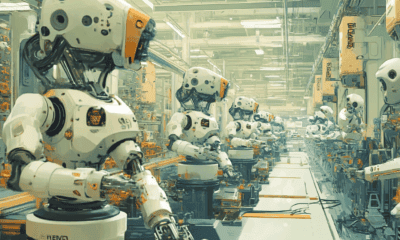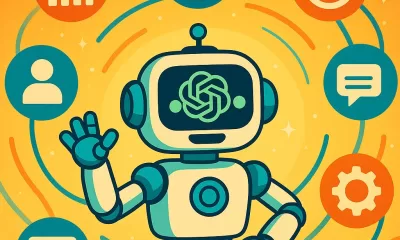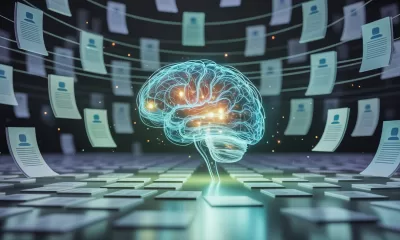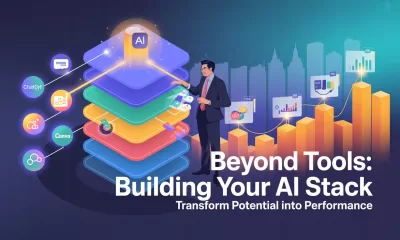Life
Why AI Skills Will Be Non-Negotiable in 2025
AI skills will be non-negotiable in 2025, transforming industries and reshaping job roles. Learn essential AI skills and their applications to future-proof your career.
Published
7 months agoon
By
AIinAsia
TL/DR: Understanding and developing AI skills in 2025 will be crucial for staying competitive in the future job market.
- AI skills are becoming essential for professionals across all industries by 2025.
- Key AI skills include data literacy, prompt engineering, machine learning fundamentals, AI ethics, and workflow automation.
- Professionals can start learning AI skills through online platforms, local certification programs, meetups, and on-the-job training.
Artificial intelligence is no longer just a buzzword—it’s a transformative force reshaping industries, redefining job roles, and creating entirely new fields of work. AI’s impact is undeniable across a wide spectrum of sectors, from finance and healthcare to marketing and logistics. In this rapidly evolving environment, AI skills have shifted from being a “nice-to-have” to an essential component of a future-ready career.
For professionals in every field, staying relevant means understanding AI and developing skills that allow them to leverage its potential effectively. The AI skill set encompasses more than just technical programming; it involves understanding data, ethical considerations, and integrating AI into daily tasks. In 2025, gaining proficiency in AI won’t just enhance your career prospects—it will future-proof them.
Here’s a comprehensive guide to the critical AI skills you need, their applications, and how to start building your AI knowledge.
The New Essential Skills for 2025
To thrive in a world where AI underpins most industries, it’s crucial to focus on a range of AI-related skills. While not everyone needs to be an AI developer, there are several accessible, practical skills that professionals across roles can benefit from:
Data Literacy and Visualisation
AI’s power lies in its ability to process and interpret massive volumes of data. Professionals who understand how to collect, analyse, and interpret data are better equipped to work alongside AI. Data literacy extends beyond basic analytics—it includes knowing how to use data visualisation tools like Tableau or Power BI to present AI-generated insights in a meaningful way.
Prompt Engineering
With the proliferation of language models, from ChatGPT to other AI-driven assistants, prompt engineering has become a unique and increasingly valuable skill. Knowing how to craft effective prompts can dramatically improve the quality of AI-generated outputs, allowing professionals to use AI more effectively in roles like content creation, customer support, and market analysis.
This prompt is designed to extract valuable insights from AI models, helping professionals understand the future landscape of AI in healthcare and how it might impact their roles:
Prompt: “Generate a list of top 10 AI trends in 2025 and their potential impact on the healthcare industry.”
Machine Learning Fundamentals
While deep expertise in machine learning isn’t necessary for most professionals, a foundational understanding is beneficial. Concepts like supervised vs. unsupervised learning, predictive analytics, and data training empower professionals to engage with AI projects and collaborate with data science teams more effectively.
AI Ethics, Privacy, and Compliance
As AI’s capabilities grow, so do ethical considerations around its use. Knowing how to navigate privacy concerns, data biases, and ethical decision-making is essential, especially for professionals handling sensitive data or working in regulated industries. Familiarity with data protection regulations, such as GDPR in Europe or PDPA in Singapore, is crucial for responsible AI deployment.
Workflow Automation and RPA (Robotic Process Automation)
Automation is reshaping roles across all sectors. RPA tools like UiPath and Blue Prism enable professionals to automate routine tasks, improving efficiency and allowing them to focus on strategic work. Mastery of RPA and other automation platforms can make professionals indispensable, as they help organisations streamline processes and reduce operational costs.
AI-Enhanced Decision-Making
AI is at its most valuable when it augments human decision-making. Developing skills in interpreting AI-driven insights and understanding their implications in a business context is crucial. This includes knowing when to trust AI predictions, how to assess accuracy, and integrating AI into strategic planning and forecasting.
Examples of AI Skill Applications Across Industries
AI’s influence is not confined to the tech sector; it’s reshaping roles across all industries. Here’s a look at how AI skills are transforming various fields and what it means for professionals:
Marketing and Sales
AI has become central to personalising customer experiences and optimising campaigns. Marketers use AI-driven analytics to segment audiences and tailor content, increasing engagement and conversion rates. Sales teams leverage AI to score leads, predict customer needs, and refine sales strategies. Familiarity with AI tools like Salesforce’s Einstein or HubSpot’s AI recommendations is becoming a must for anyone in these roles.
Healthcare and Life Sciences
AI is revolutionising patient care and diagnostics. Professionals in these fields are increasingly relying on AI to interpret medical data, identify risk factors, and support diagnostic processes. For example, AI systems can detect anomalies in imaging scans, giving healthcare workers valuable support in diagnosing diseases early. Knowledge of AI-powered diagnostic tools and an understanding of medical data privacy regulations (e.g., HIPAA in the U.S.) are essential for healthcare professionals.
Finance and Banking
AI is being used to detect fraud, assess credit risk, and automate trading processes. Financial professionals are expected to understand how to interpret AI-driven risk assessments and leverage predictive analytics for real-time decision-making. Skills in Python for financial data analysis, machine learning for predictive insights, and an understanding of ethical data use in finance are key.
Customer Service and Support
AI is reshaping customer service with chatbots, virtual assistants, and sentiment analysis. Prompt engineering skills help support agents get the most out of AI tools, crafting responses that align with customer needs. AI can analyse customer sentiment in real time, enabling support agents to address concerns proactively and enhance customer satisfaction.
Human Resources and Recruitment
HR professionals are turning to AI for more efficient recruitment and employee engagement. AI can screen resumes, identify high-potential candidates, and even monitor employee satisfaction through sentiment analysis. Understanding AI-driven recruitment platforms like Lever and Workday and being aware of data privacy in employee data handling can significantly boost an HR professional’s effectiveness.
How to Start Learning AI Skills in Asia
With AI skills in such high demand, the opportunities to acquire them are more accessible than ever. Here are some steps for getting started, with a focus on resources and programs in Asia:
Online Learning Platforms
Coursera, edX, and Udacity provide AI courses that range from beginner to advanced levels, often in partnership with universities like the National University of Singapore, Tsinghua University, and Indian Institute of Technology. These courses cover machine learning basics, data analytics, and AI ethics, providing a comprehensive starting point for learners.
Local Certification Programs and Workshops
Several organisations in Asia offer in-person workshops and certification programs. The SQREEM Symposium in Singapore, for example, offers hands-on training in AI tools and automation. These sessions are invaluable for gaining practical, regionally relevant experience and connecting with industry professionals.
Meetups and Professional Networks
AI-focused meetups and professional networks, like those on Meetup or LinkedIn, offer valuable opportunities for community learning. Being part of groups dedicated to AI allows professionals to discuss emerging trends, exchange tips, and stay motivated.
On-the-Job Training and Upskilling Programs
Many organisations are now providing in-house AI training for employees, recognising the importance of AI proficiency. Professionals should seek out these opportunities and take advantage of company-sponsored courses to develop skills directly applicable to their roles.
Self-Led Exploration
AI tools are often freely accessible or available at low cost, making it easier for professionals to experiment. Tools like ChatGPT, Google Colab, and data visualisation platforms (e.g., Power BI) allow individuals to apply their learning in real-world contexts. Building side projects or taking on small AI-driven tasks can boost confidence and practical skills.
The Future of Work: AI’s Role in Career Development
Looking forward, the impact of AI on career development will only grow. In 2025 and beyond, professionals will need not only to understand AI tools but also to adapt to an environment where AI is an integral part of strategic planning and operations. Here’s how AI will influence the future of work:
Increased Emphasis on Hybrid Skills
As AI handles routine tasks, human skills like creativity, problem-solving, and critical thinking will be in greater demand. Professionals who blend technical AI skills with strong interpersonal abilities will stand out.
Lifelong Learning Culture with AI Education
The AI landscape evolves rapidly, and continuous learning will be crucial to stay current. Professionals should prioritise ongoing skill development to keep up with new AI technologies, tools, and industry applications.
Greater Collaboration with AI Systems
In 2025, most jobs will involve working closely with AI systems. Professionals should embrace this collaboration, seeing AI as a partner that enhances their abilities rather than a competitor.
Building a Future-Proof Career in the Age of AI
As 2025 unfolds, AI will continue to redefine industries and reshape the professional landscape. Building a future-proof career means investing in AI skills that make you adaptable, resourceful, and prepared for the opportunities AI brings. Whether it’s data literacy, machine learning, or workflow automation, AI skills equip you to drive value in your role, make informed decisions, and remain competitive.
The journey to AI fluency may seem daunting, but even small steps can lead to substantial rewards. Start by mastering one skill, such as prompt engineering or data literacy, and gradually expand your expertise. In the age of AI, adaptability and curiosity are your most valuable assets. Embrace them, and you’ll be well-positioned to not only survive but thrive in the workforce of the future.
Join the Conversation
What AI skills are you most excited to learn and why? Share your thoughts and experiences below, and don’t forget to subscribe for updates on AI and AGI developments. Subscribe here to stay informed and engaged!
You may also like:
- Work Smarter, Not Harder: AI Hacks for Asian Professionals
- Mastering the Art of AI Prompts for Everyday Requests
- Reaching Today’s Consumers – How AI Enhances Digital Marketing
- Or try ChatGPT by tapping here.
Author
Discover more from AIinASIA
Subscribe to get the latest posts sent to your email.
You may like
-


Where Can You Apply Generative vs. Analytical AI Effectively?
-


Adrian’s Arena: AI in 2024 – Key Lessons and Bold Predictions for 2025
-


ChatGPT’s New Voice-Sharing Feature Explained
-


Mistral’s Pixtral 12B and the Future of Multimodal Models
-


The AI Revolution: Asia’s Role in a Transforming World
-


Unilever and Accenture: Revolutionising Productivity with Generative AI
Life
Adrian’s Arena: Will AI Get You Fired? 9 Mistakes That Could Cost You Everything
Will AI get you fired? Discover 9 career-killing AI mistakes professionals make—and how to avoid them.
Published
2 weeks agoon
May 15, 2025
TL;DR — What You Need to Know:
- Common AI mistakes that cost jobs can happen — fast
- Most are fixable if you know what to watch for.
- Avoid these pitfalls and make AI your career superpower.
Don’t blame the robot.
If you’re careless with AI, it’s not just your project that tanks — your career could be next.
Across Asia and beyond, professionals are rushing to implement artificial intelligence into workflows — automating reports, streamlining support, crunching data. And yes, done right, it’s powerful. But here’s what no one wants to admit: most people are doing it wrong.
I’m not talking about missing a few prompts or failing to generate that killer deck in time. I’m talking about the career-limiting, confidence-killing, team-splintering mistakes that quietly build up and explode just when it matters most. If you’re not paying attention, AI won’t just replace your role — it’ll ruin your reputation on the way out.
Here are 9 of the most common, most damaging AI blunders happening in businesses today — and how you can avoid making them.
1. You can’t fix bad data with good algorithms.
Let’s start with the basics. If your AI tool is churning out junk insights, odds are your data was junk to begin with. Dirty data isn’t just inefficient — it’s dangerous. It leads to flawed decisions, mis-targeted customers, and misinformed strategies. And when the campaign tanks or the budget overshoots, guess who gets blamed?
The solution? Treat your data with the same respect you’d give your P&L. Clean it, vet it, monitor it like a hawk. AI isn’t magic. It’s maths — and maths hates mess.
2. Don’t just plug in AI and hope for the best.
Too many teams dive into AI without asking a simple question: what problem are we trying to solve? Without clear goals, AI becomes a time-sink — a parade of dashboards and models that look clever but achieve nothing.
Worse, when senior stakeholders ask for results and all you have is a pretty interface with no impact, that’s when credibility takes a hit.
AI should never be a side project. Define its purpose. Anchor it to business outcomes. Or don’t bother.
3. Ethics aren’t optional — they’re existential.
You don’t need to be a philosopher to understand this one. If your AI causes harm — whether that’s through bias, privacy breaches, or tone-deaf outputs — the consequences won’t just be technical. They’ll be personal.
Companies can weather a glitch. What they can’t recover from is public outrage, legal fines, or internal backlash. And you, as the person who “owned” the AI, might be the one left holding the bag.
Bake in ethical reviews. Vet your training data. Put in safeguards. It’s not overkill — it’s job insurance.
4. Implementation without commitment is just theatre.
I’ve seen it more than once: companies announce a bold AI strategy, roll out a tool, and then… nothing. No training. No process change. No follow-through. That’s not innovation. That’s box-ticking.
If you half-arse AI, it won’t just fail — it’ll visibly fail. Your colleagues will notice. Your boss will ask questions. And next time, they might not trust your judgement.
AI needs resourcing, support, and leadership. Otherwise, skip it.
5. You can’t manage what you can’t explain.
Ever been in a meeting where someone says, “Well, that’s just what the model told us”? That’s a red flag — and a fast track to blame when things go wrong.
So-called “black box” models are risky, especially in regulated industries or customer-facing roles. If you can’t explain how your AI reached a decision, don’t expect others to trust it — or you.
Use interpretable models where possible. And if you must go complex, document it like your job depends on it (because it might).
6. Face the bias before it becomes your headline.
Facial recognition failing on darker skin tones. Recruitment tools favouring men. Chatbots going rogue with offensive content. These aren’t just anecdotes — they’re avoidable, career-ending screw-ups rooted in biased data.
It’s not enough to build something clever. You have to build it responsibly. Test for bias.
Diversify your datasets. Monitor performance. Don’t let your project become the next PR disaster.
7. Training isn’t optional — it’s survival.
If your team doesn’t understand the tool you’ve introduced, you’re not innovating — you’re endangering operations. AI can amplify productivity or chaos, depending entirely on who’s driving.
Upskilling is non-negotiable. Whether it’s hiring external expertise or running internal workshops, make sure your people know how to work with the machine — not around it.
8. Long-term vision beats short-term wow.
Sure, the first week of AI adoption might look good. Automate a few slides, speed up a report — you’re a hero.
But what happens three months down the line, when the tool breaks, the data shifts, or the model needs recalibration?
AI isn’t set-and-forget. Plan for evolution. Plan for maintenance. Otherwise, short-term wins can turn into long-term liabilities.
9. When everything’s urgent, documentation feels optional.
Until someone asks, “Who changed the model?” or “Why did this customer get flagged?” and you have no answers.
In AI, documentation isn’t admin — it’s accountability.
Keep logs, version notes, data flow charts. Because sooner or later, someone will ask, and “I’m not sure” won’t cut it.
Final Thoughts: AI doesn’t cost jobs. People misusing AI do.
Most AI mistakes aren’t made by the machines — they’re made by humans cutting corners, skipping checks, and hoping for the best. And the consequences? Lost credibility. Lost budgets. Lost roles.
But it doesn’t have to be that way.
Used wisely, AI becomes your competitive edge. A signal to leadership that you’re forward-thinking, capable, and ready for the future. Just don’t stumble on the same mistakes that are currently tripping up everyone else.
So the real question is: are you using AI… or is it quietly using you?
You may also like:
- Bridging the AI Skills Gap: Why Employers Must Step Up
- From Ethics to Arms: Google Lifts Its AI Ban on Weapons and Surveillance
- Or try the free version of Google Gemini by tapping here.
Author
-
Adrian is an AI, marketing, and technology strategist based in Asia, with over 25 years of experience in the region. Originally from the UK, he has worked with some of the world’s largest tech companies and successfully built and sold several tech businesses. Currently, Adrian leads commercial strategy and negotiations at one of ASEAN’s largest AI companies. Driven by a passion to empower startups and small businesses, he dedicates his spare time to helping them boost performance and efficiency by embracing AI tools. His expertise spans growth and strategy, sales and marketing, go-to-market strategy, AI integration, startup mentoring, and investments. View all posts
Discover more from AIinASIA
Subscribe to get the latest posts sent to your email.
Life
FAKE FACES, REAL CONSEQUENCES: Should NZ Ban AI in Political Ads?
New Zealand has no laws preventing the use of deepfakes or AI-generated content in political campaigns. As the 2025 elections approach, is it time for urgent reform?
Published
3 weeks agoon
May 14, 2025By
AIinAsia
TL;DR — What You Need to Know
- New Zealand politician campaigns are already dabbling with AI-generated content — but without clear rules or disclosures.
- Deepfakes and synthetic images of ethnic minorities risk fuelling cultural offence and voter distrust.
- Other countries are moving fast with legislation. Why is New Zealand dragging its feet?
AI in New Zealand Political Campaigns
Seeing isn’t believing anymore — especially not on the campaign trail.
In the build-up to the 2025 local body elections, New Zealand voters are being quietly nudged into a new kind of uncertainty: Is what they’re seeing online actually real? Or has it been whipped up by an algorithm?
This isn’t science fiction. From fake voices of Joe Biden in the US to Peter Dutton deepfakes dancing across TikTok in Australia, we’ve already crossed the threshold into AI-assisted campaigning. And New Zealand? It’s not far behind — it just lacks the rules.
The National Party admitted to using AI in attack ads during the 2023 elections. The ACT Party’s Instagram feed includes AI-generated images of Māori and Pasifika characters — but nowhere in the posts do they say the images aren’t real. One post about interest rates even used a synthetic image of a Māori couple from Adobe’s stock library, without disclosure.
That’s two problems in one. First, it’s about trust. If voters don’t know what’s real and what’s fake, how can they meaningfully engage? Second, it’s about representation. Using synthetic people to mimic minority communities without transparency or care is a recipe for offence — and harm.
Copy-Paste Cultural Clangers
Australians already find some AI-generated political content “cringe” — and voters in multicultural societies are noticing. When AI creates people who look Māori, Polynesian or Southeast Asian, it often gets the cultural signals all wrong. Faces are oddly symmetrical, clothing choices are generic, and context is stripped away. What’s left is a hollow image that ticks the diversity box without understanding the lived experience behind it.
And when political parties start using those images without disclosure? That’s not smart targeting. That’s political performance, dressed up as digital diversity.
A Film-Industry Fix?
If you’re looking for a local starting point for ethical standards, look to New Zealand’s film sector. The NZ Film Commission’s 2025 AI Guidelines are already ahead of the game — promoting human-first values, cultural respect, and transparent use of AI in screen content.
The public service also has an AI framework that calls for clear disclosure. So why can’t politics follow suit?
Other countries are already acting. South Korea bans deepfakes in political ads 90 days before elections. Singapore outlaws digitally altered content that misrepresents political candidates. Even Canada is exploring policy options. New Zealand, in contrast, offers voluntary guidelines — which are about as enforceable as a handshake on a Zoom call.
Where To Next?
New Zealand doesn’t need to reinvent the wheel. But it does need urgent rules — even just a basic requirement for political parties to declare when they’re using AI in campaign content. It’s not about banning creativity. It’s about respecting voters and communities.
In a multicultural democracy, fake faces in real campaigns come with consequences. Trust, representation, and dignity are all on the line.
What do YOU think?
Should political parties be forced to declare AI use in their ads — or are we happy to let the bots keep campaigning for us?
You may also like:
- AI Chatbots Struggle with Real-Time Political News: Are They Ready to Monitor Elections?
- Supercharge Your Social Media: 5 ChatGPT Prompts to Skyrocket Your Following
- AI Solves the ‘Cocktail Party Problem’: A Breakthrough in Audio Forensics
Author
Discover more from AIinASIA
Subscribe to get the latest posts sent to your email.
Life
7 Mind-Blowing New ChatGPT Use Cases in 2025
Discover 7 powerful new ChatGPT use cases for 2025 — from sales training to strategic planning. Built for real businesses, not just techies.
Published
3 weeks agoon
May 14, 2025By
AIinAsia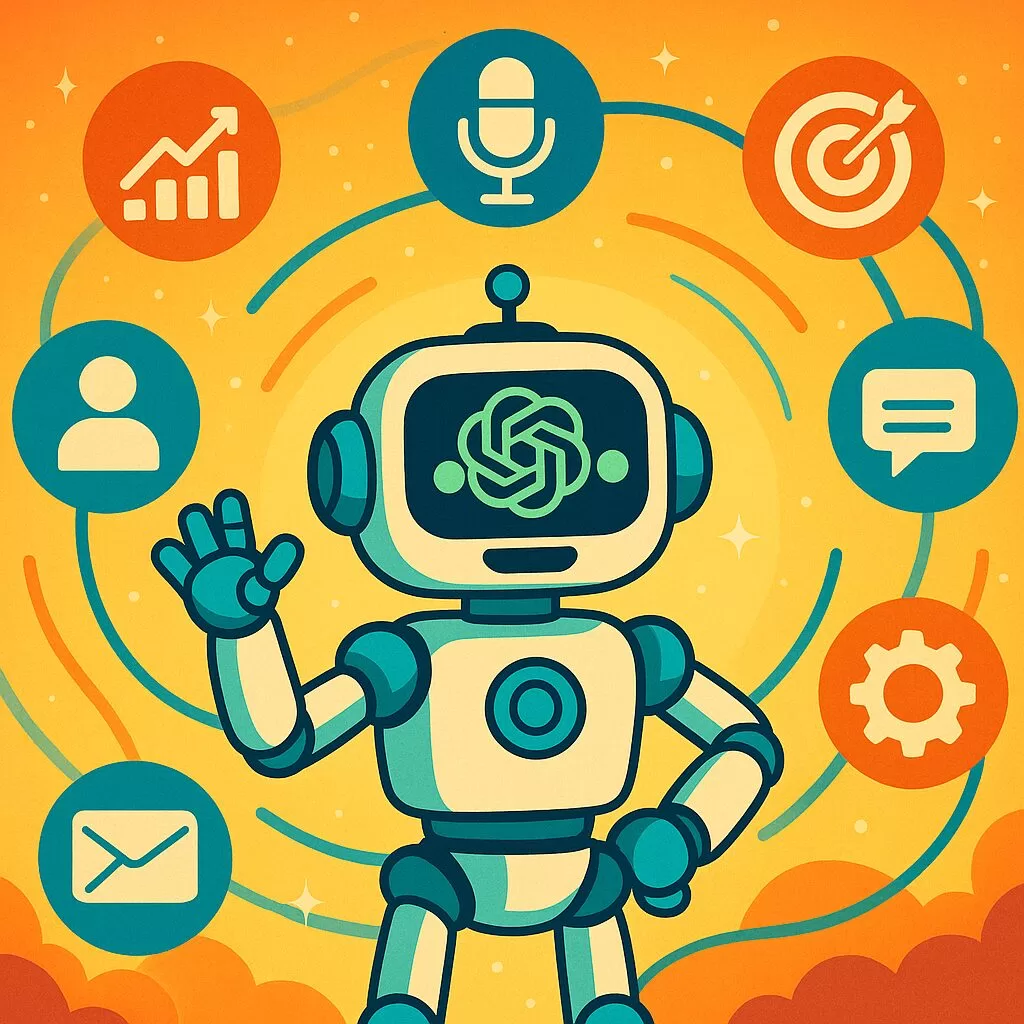
TL;DR — What You Need to Know:
- ChatGPT use cases in 2025 — they’re changing the way we work – and fast
- It’s new capabilities are shockingly useful — from real-time strategy building to smarter email, training, and customer service.
- The tech’s no longer the limiting factor. How you use it is what sets winners apart.
- You don’t need a dev team — just smart prompts, good judgement, and a bit of experimentation.
Welcome to Your New ChatGPT Use Cases in 2025
Something extraordinary is happening with AI — and this time, it’s not just another update. ChatGPT’s latest model has quietly become one of the most powerful tools on the planet, capable of outperforming human professionals in everything from sales role-play to strategic planning.
Here’s what’s changed: 2025’s AI isn’t just faster or more fluent. It’s fundamentally more useful. And while most people are still asking it to write birthday poems or summarise PDFs, smart businesses are doing something entirely different.
They’re solving real problems.
So here are 7 powerful, practical, and slightly mind-blowing ways you can use ChatGPT right now — whether you’re running a startup, scaling a business, or just trying to survive your inbox.
1. The Intelligence Quantum Leap
Let’s start with the big one. GPT-4o — OpenAI’s flagship model for 2025 — doesn’t just understand language. It reasons. It plans. It scores higher than the average human on standardised IQ tests.
And yes, that’s both impressive and terrifying.
But the real win for business? You now have on-demand access to a logic machine that can unpack strategy, simulate market moves, and give brutally clear feedback on your plans — without needing a whiteboard or a 5-hour workshop.
Ask ChatGPT:
“Compare three go-to-market strategies for a mid-priced SaaS product in Southeast Asia targeting logistics firms.”
It’ll give you a side-by-side breakdown faster than most consultants.
Why it matters:
The days of ‘I’ll get back to you after I crunch the data’ are over. You now crunch in real time. Strategy meetings just got smarter — and shorter.
2. Email Management: The Silent Revolution
Email is where good ideas go to die. But what if AI could handle the grunt work — without sounding like a robot?
In 2025, it can. ChatGPT now plugs seamlessly into tools like Zapier, Make.com, and even Outlook or Gmail via APIs. That means you can automate 80% of your email workflow:
- Draft responses in your tone of voice
- Auto-tag or file messages based on content
- Trigger follow-ups without lifting a finger
Real use case:
A boutique agency in Singapore uses ChatGPT to scan all inbound client emails, draft smart replies with custom links, and log actions in Notion. Result? 40% time saved, zero missed follow-ups.
But beware:
Letting AI send emails unsupervised is asking for trouble. Use a “draft-and-review” loop — AI writes it, you approve it.
3. Voice-Powered Strategy: AI That Walks With You
Here’s a glimpse of the future: You’re walking to get kopi. You press and hold your ChatGPT app. You say:
“I’m thinking about launching a mini-course for HR leaders on AI literacy. Maybe bundle it with a coaching session. Can you sketch out a funnel?”
By the time you get back to your desk, it’s done. A structured funnel. Headline ideas. Audience personas. Even suggested pricing tiers.
This is now live.
The new voice interaction mode in ChatGPT feels like talking to a strategist who never gets tired. It remembers what you said, clarifies details, and adapts based on your feedback. Use it during your commute. In the gym. While cooking.
Think about it:
Your best thinking doesn’t always happen at your desk. Now, it doesn’t have to.
4. Sales Role-Play (That Doesn’t Suck)
Sales teams have always known the value of practice. But let’s be honest: traditional role-play is awkward, slow, and often skipped.
Now imagine this: You open ChatGPT and say:
“Pretend you’re a CFO pushing back on my pitch for enterprise expense software. Hit me with your top three objections.”
It does. Relentlessly. Then you tweak it:
“Now play a more sceptical CFO. Use financial jargon. Be unimpressed.”
It does that too.
Why it works:
There’s no fear of judgement. No awkwardness. Just high-impact reps that sharpen your message and steel your nerves.
Results?
One founder I know used this daily before calls — and closed 4 out of 5 deals that quarter. That’s not hype. That’s practice made perfect.
5. Marketing Psychology at Scale
Your customers are constantly telling you what they care about. But the signal’s buried in reviews, chats, complaints, comments, and survey feedback.
ChatGPT is now ridiculously good at sifting through this mess and surfacing insights — emotional tone, patterns in word choice, common objections, even specific desires.
Example prompt:
“Analyse these 250 customer reviews. What do customers love most? What words do they use to describe our product? What are their biggest frustrations?”
What you get is a heatmap of customer psychology.
Smart marketers use this to:
Reframe messaging
Write landing pages in the customer’s voice
Identify overlooked objections early
Bonus trick:
Feed this analysis into your ad copywriting prompts. CTRs go up. Every. Single. Time.
6. 24/7 Customer Engagement — That Doesn’t Feel Robotic
We’ve all used chatbots that sound like your uncle trying to be cool. Not anymore.
With GPT-4o and custom instructions, you can now build a digital agent that actually sounds like your brand, asks smart follow-ups, and guides users toward decisions.
Imagine this:
You run an e-commerce site. A customer asks about shipping options. Instead of a static FAQ or slow email reply, ChatGPT:
- Asks where they’re based
- Calculates delivery timelines
- Recommends a bundled offer
- Logs the lead to your CRM
All in real time.
Result?
One online skincare brand reported a 50% increase in cart completions just by switching to an AI-led chat system.
The real kicker? Customers prefer talking to it.
7. Your Digital Ops Manual — Finally Done
Every business struggles with documenting processes. SOPs are boring, messy, and constantly out of date.
But ChatGPT? It lives for this.
Feed it rough notes, voice memos, old docs — and it turns them into clear, structured workflows.
Now take it one step further:
Set up a private knowledge base where your team can ask questions naturally and get precise answers.
“What’s our refund process for EU customers?”
“How do I update a client billing profile?”
“What’s the Slack etiquette for our sales team?”
ChatGPT answers. With citations.
Training time drops. Mistakes go down. New hires ramp up faster.
Best of all?
It gets smarter the more your team uses it.
So… What’s Stopping You Trying These ChatGPT Use Cases in 2025?
Every use case in this article is live. Affordable. And 100% usable today. No code. No dev team. No six-month roadmap.
Just smarter thinking — and a willingness to try.
So here’s the real question:
What’s your excuse for not using AI like this yet… and how long can you afford to wait?
You may also like:
- AI in Email Marketing: A New Dawn
- Omptimise Your Sales Strategy with ChatGPT: Top AI Prompts for Sellers
- Transforming Sales Coaching in Asia With AI
- Or try these out now on the free version of ChatGPT by tapping here.
Author
Discover more from AIinASIA
Subscribe to get the latest posts sent to your email.

Upgrade Your ChatGPT Game With These 5 Prompts Tips

If AI Kills the Open Web, What’s Next?

Build Your Own Custom GPT in Under 30 Minutes – Step-by-Step Beginner’s Guide
Trending
-

 Life3 weeks ago
Life3 weeks ago7 Mind-Blowing New ChatGPT Use Cases in 2025
-

 Learning2 weeks ago
Learning2 weeks agoHow to Use the “Create an Action” Feature in Custom GPTs
-

 Business3 weeks ago
Business3 weeks agoAI Just Killed 8 Jobs… But Created 15 New Ones Paying £100k+
-

 Tools3 weeks ago
Tools3 weeks agoEdit AI Images on the Go with Gemini’s New Update
-

 Learning6 days ago
Learning6 days agoBuild Your Own Custom GPT in Under 30 Minutes – Step-by-Step Beginner’s Guide
-

 Learning2 weeks ago
Learning2 weeks agoHow to Upload Knowledge into Your Custom GPT
-

 Business1 week ago
Business1 week agoAdrian’s Arena: Stop Collecting AI Tools and Start Building a Stack
-

 Life2 weeks ago
Life2 weeks agoAdrian’s Arena: Will AI Get You Fired? 9 Mistakes That Could Cost You Everything











